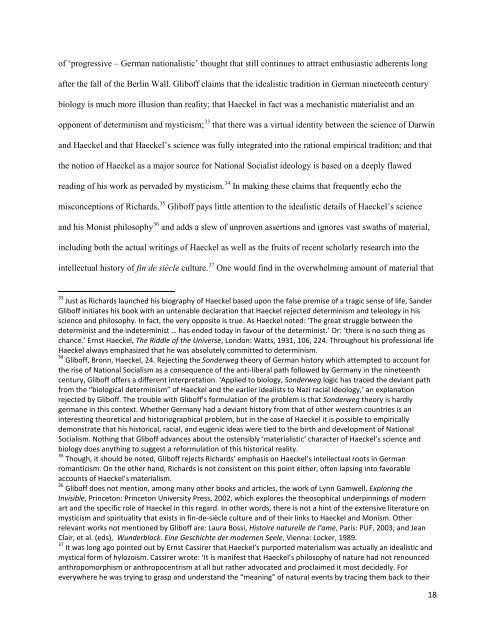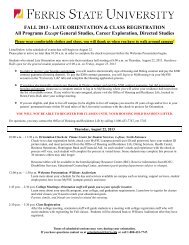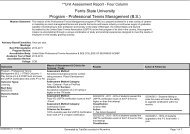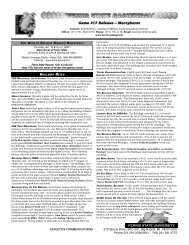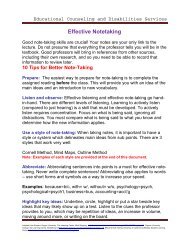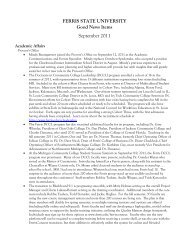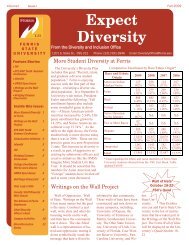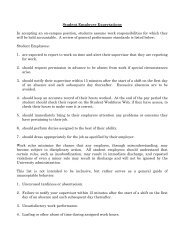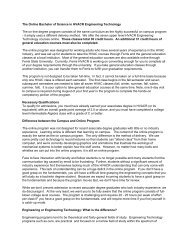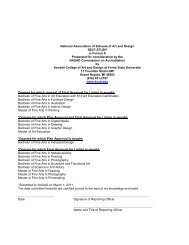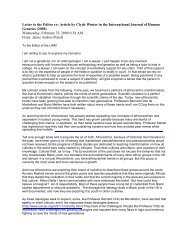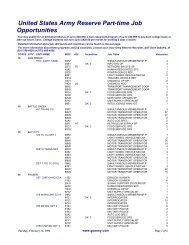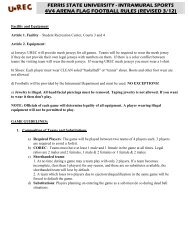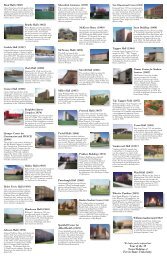Daniel Gasman - Ferris State University
Daniel Gasman - Ferris State University
Daniel Gasman - Ferris State University
You also want an ePaper? Increase the reach of your titles
YUMPU automatically turns print PDFs into web optimized ePapers that Google loves.
of ‘progressive – German nationalistic’ thought that still continues to attract enthusiastic adherents long<br />
after the fall of the Berlin Wall. Gliboff claims that the idealistic tradition in German nineteenth century<br />
biology is much more illusion than reality; that Haeckel in fact was a mechanistic materialist and an<br />
opponent of determinism and mysticism; 33 that there was a virtual identity between the science of Darwin<br />
and Haeckel and that Haeckel’s science was fully integrated into the rational empirical tradition; and that<br />
the notion of Haeckel as a major source for National Socialist ideology is based on a deeply flawed<br />
reading of his work as pervaded by mysticism. 34 In making these claims that frequently echo the<br />
misconceptions of Richards, 35 Gliboff pays little attention to the idealistic details of Haeckel’s science<br />
and his Monist philosophy 36 and adds a slew of unproven assertions and ignores vast swaths of material,<br />
including both the actual writings of Haeckel as well as the fruits of recent scholarly research into the<br />
intellectual history of fin de siècle culture. 37<br />
One would find in the overwhelming amount of material that<br />
33 Just as Richards launched his biography of Haeckel based upon the false premise of a tragic sense of life, Sander<br />
Gliboff initiates his book with an untenable declaration that Haeckel rejected determinism and teleology in his<br />
science and philosophy. In fact, the very opposite is true. As Haeckel noted: ‘The great struggle between the<br />
determinist and the indeterminist … has ended today in favour of the determinist.’ Or: ‘there is no such thing as<br />
chance.’ Ernst Haeckel, The Riddle of the Universe, London: Watts, 1931, 106, 224. Throughout his professional life<br />
Haeckel always emphasized that he was absolutely committed to determinism.<br />
34 Gliboff, Bronn, Haeckel, 24. Rejecting the Sonderweg theory of German history which attempted to account for<br />
the rise of National Socialism as a consequence of the anti-liberal path followed by Germany in the nineteenth<br />
century, Gliboff offers a different interpretation. ‘Applied to biology, Sonderweg logic has traced the deviant path<br />
from the “biological determinism” of Haeckel and the earlier idealists to Nazi racial ideology,’ an explanation<br />
rejected by Gliboff. The trouble with Gliboff’s formulation of the problem is that Sonderweg theory is hardly<br />
germane in this context. Whether Germany had a deviant history from that of other western countries is an<br />
interesting theoretical and historiographical problem, but in the case of Haeckel it is possible to empirically<br />
demonstrate that his historical, racial, and eugenic ideas were tied to the birth and development of National<br />
Socialism. Nothing that Gliboff advances about the ostensibly ‘materialistic’ character of Haeckel’s science and<br />
biology does anything to suggest a reformulation of this historical reality.<br />
35 Though, it should be noted, Gliboff rejects Richards’ emphasis on Haeckel’s intellectual roots in German<br />
romanticism. On the other hand, Richards is not consistent on this point either, often lapsing into favorable<br />
accounts of Haeckel’s materialism.<br />
36 Gliboff does not mention, among many other books and articles, the work of Lynn Gamwell, Exploring the<br />
Invisible, Princeton: Princeton <strong>University</strong> Press, 2002, which explores the theosophical underpinnings of modern<br />
art and the specific role of Haeckel in this regard. In other words, there is not a hint of the extensive literature on<br />
mysticism and spirituality that exists in fin-de-siècle culture and of their links to Haeckel and Monism. Other<br />
relevant works not mentioned by Gliboff are: Laura Bossi, Histoire naturelle de l’ame, Paris: PUF, 2003; and Jean<br />
Clair, et al. (eds), Wunderblock. Eine Geschichte der modernen Seele, Vienna: Locker, 1989.<br />
37 It was long ago pointed out by Ernst Cassirer that Haeckel’s purported materialism was actually an idealistic and<br />
mystical form of hylozoism. Cassirer wrote: ‘It is manifest that Haeckel’s philosophy of nature had not renounced<br />
anthropomorphism or anthropocentrism at all but rather advocated and proclaimed it most decidedly. For<br />
everywhere he was trying to grasp and understand the “meaning” of natural events by tracing them back to their<br />
18


